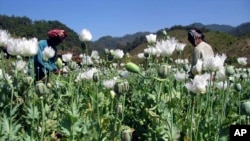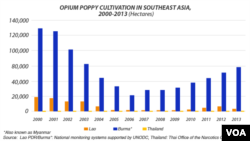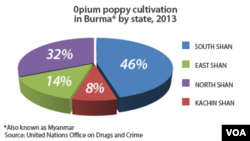The United Nations says opium production in Burma continued to increase in 2013, in part because poppy farmers had few other ways to make a living.
In an annual report, the U.N. Office on Drugs and Crime estimated Burma, also known as Myanmar, produced 870 tons of opium in 2013 - the highest amount since it began keeping track in 2002.
Burma is second only to Afghanistan in growing opium poppies, a key ingredient in heroin and other illegal drugs.
In 1999, the country promised to eradicate opium production by 2014. But production has now gone up for seven straight years.
Jason Eligh, UNODC's country manager for Burma, says the idea of a drug-free Burma is a "quite long way away."
One of the main problems, Eligh says, is that opium poppies are the only source of adequate income for many farmers in Burma, which is Southeast Asia's poorest country.
"If a family has no money and they don't have the capacity through the environment around them to earn money, then they're going to take whatever measures they can to try and get money just to survive, just to eat, and that's what we're seeing occurring," he said.
Year after year, the UNODC reports find that opium production is also linked to ethnic unrest along Burma's northeast border areas.
Most of Burma's illegal opium crops are found in Kachin and Shan states, where violence between insurgents and the army have raged on for as long as 50 years.
"That's a long period of time for local infrastructure to deteriorate and in some places disappear completely. So your options, your opportunities as a farmer are significantly restricted," said Eligh.
Burma's government has tried to reach peace deals with many ethnic insurgent groups, though fighting rages on in some areas.
The peace efforts are part of Burma's wider political and economic reforms and opening up, which follow decades of stifling, direct military rule.
But while the region has seen improved infrastructure, Eligh says this has provided more opportunities for criminals to benefit from the illegal drug trade.
"As you get more roads, as you get bridges crossing rivers, as you get economies that are starting to integrate better with those around them... you're seeing an environment for an increase in flow of a variety of different products, and heroin is just one of a number of products that are moved for profit," he said.
The U.N. report also cited rising demand for illegal drugs in nearby countries, such as China, as something that was exacerbating Burma's opium problem.
In an annual report, the U.N. Office on Drugs and Crime estimated Burma, also known as Myanmar, produced 870 tons of opium in 2013 - the highest amount since it began keeping track in 2002.
Burma is second only to Afghanistan in growing opium poppies, a key ingredient in heroin and other illegal drugs.
In 1999, the country promised to eradicate opium production by 2014. But production has now gone up for seven straight years.
Jason Eligh, UNODC's country manager for Burma, says the idea of a drug-free Burma is a "quite long way away."
One of the main problems, Eligh says, is that opium poppies are the only source of adequate income for many farmers in Burma, which is Southeast Asia's poorest country.
"If a family has no money and they don't have the capacity through the environment around them to earn money, then they're going to take whatever measures they can to try and get money just to survive, just to eat, and that's what we're seeing occurring," he said.
Year after year, the UNODC reports find that opium production is also linked to ethnic unrest along Burma's northeast border areas.
Most of Burma's illegal opium crops are found in Kachin and Shan states, where violence between insurgents and the army have raged on for as long as 50 years.
"That's a long period of time for local infrastructure to deteriorate and in some places disappear completely. So your options, your opportunities as a farmer are significantly restricted," said Eligh.
Burma's government has tried to reach peace deals with many ethnic insurgent groups, though fighting rages on in some areas.
The peace efforts are part of Burma's wider political and economic reforms and opening up, which follow decades of stifling, direct military rule.
But while the region has seen improved infrastructure, Eligh says this has provided more opportunities for criminals to benefit from the illegal drug trade.
"As you get more roads, as you get bridges crossing rivers, as you get economies that are starting to integrate better with those around them... you're seeing an environment for an increase in flow of a variety of different products, and heroin is just one of a number of products that are moved for profit," he said.
The U.N. report also cited rising demand for illegal drugs in nearby countries, such as China, as something that was exacerbating Burma's opium problem.







